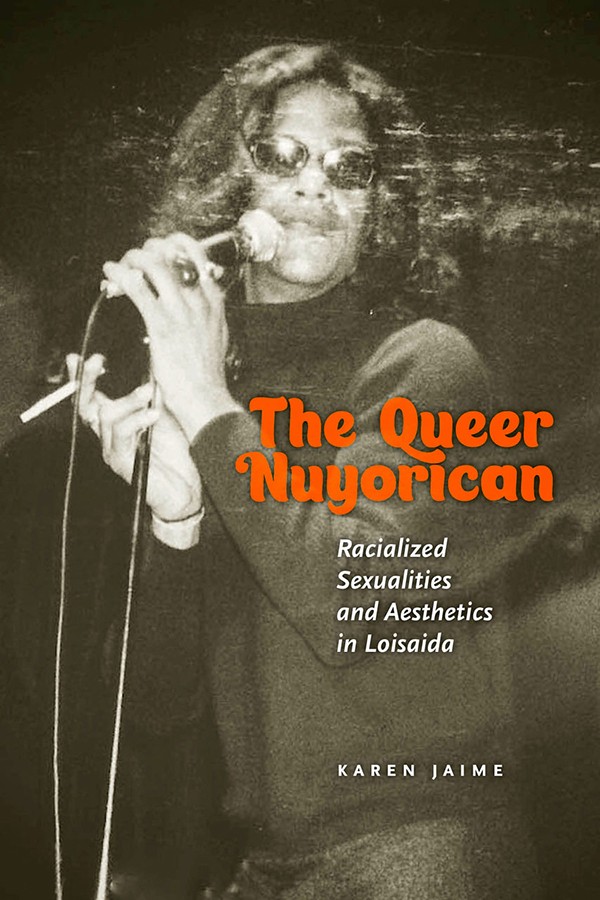Book explores historical queerness of the Nuyorican Poets Cafe
By David Nutt
Founded in 1973 by a group of predominantly Puerto Rican artists, the Nuyorican Poets Cafe quickly became a countercultural oasis on New York City’s Lower East Side, bringing together members of the Beats, the Black Arts and the Chicano and New York Puerto Rican – or Nuyorican – movements, all in an economically marginalized neighborhood.
But that history, as it’s commonly understood, left out a crucial element. In her new book, “The Queer Nuyorican: Racialized Sexualities and Aesthetics in Loisaida,” published June 29 by NYU Press, Karen Jaime ’97 highlights the role of queer and transgender artists of color who were part and parcel of the cafe since its very beginnings.
“What’s really interesting about the space and these artists is that there is a queerness that has always been at the cafe, but that has never been used to frame the space,” said Jaime, assistant professor of performing and media arts and Latina/o studies in the College of Arts and Sciences, and the onetime host and curator of the cafe’s famed Friday Night Poetry Slam. “It’s always told within a particular framework that is heteromasculine, heteropatriarchal, that really doesn’t attend to the cafe’s historical queerness.”
Jaime was first introduced to the Nuyorican Poets Cafe in a class, Poetry and Politics in the Americas, that she took as a Cornell undergraduate majoring in history and Spanish literature. In reading about the cafe, she immediately saw echoes of the political activism she was participating in on campus – including a Day Hall takeover in 1993 – in protest of the underrepresentation and underserving of Latinas/os/xs at the university. At the time, she was also discovering poetry and spoken word performance as a means to both articulate her own frustrations and work to affect change in her community and the larger world.
“Reading about the Nuyorican Poets Cafe in that English class initially for me was like, wow, what we’re doing on campus is part of a historical narrative that’s been happening in different places,” Jaime said. “I was fascinated by it. And I made it my mission to go and visit it one day.”
A few months after graduating from Cornell, Jaime made her way to the cafe. She found not only a celebrated landmark that encompassed poetry, music and theater with political and sociocultural conviction, but a place, too, for her to grow as an artist and performer.
“From that day forward, I felt a deep connection to the space,” said Jaime, who began performing at the cafe in ’97, followed by her hosting its Friday Night Poetry Slam a few years later. “The first time I was on stage, it was a dreamlike experience. It really felt like I was supposed to be there and be a part of that moment and that community, and help create that experience for audiences. It was incredible to be in a space that was founded by people of color, who are deeply committed and invested in creating work that was political in content and ethnically affirming,”
While she didn’t instantly identify it as such, Jaime came to see the cafe as a place that was historically queer, not just in terms of sexuality, but in terms of artistic practices that challenged artistic norms.
To reframe that history, Jaime’s book explores the contributions of figures such as cafe co-founder Miguel Piñero, a bisexual poet and playwright whose work focused on people who used and abused drugs, who were hustlers impacted by poverty, and who were framed as the “social outcasts” of the Lower East Side – “Loisaida” in Nuyorican parlance. Piñero’s writing and performance style prefigured the slam poetry scene that emerged in the 1980s and 90s, a period in which the cafe was the only poetry slam venue in all of New York City.
Other book chapters focus on Regie Cabico, who crafted a form of queer hip-hop theater that drew from his experiences as a performance poet; Ellison Glenn, a Black transgender spoken word performance artist and musician; and the café’s long-running Glam Slam series, which combined competitive spoken word/slam poetry and ball culture communities. Featuring performers like Andres “Mother Diva” Xavier, the Glam Slam transformed the cafe into a “definitively queer space, and not just a space that happened to have queer people in it,” Jaime said.
Jaime aligns these performers with a “nuyorican” aesthetic that is distinguished from the ethnic designation “Nuyorican,” which was first used as a pejorative levied at Puerto Ricans born and raised in the United States, specifically New York City, before being reclaimed by that same community. The nuyorican aesthetic acknowledges the word’s ethnic and historical roots while expanding it to include artists who are not Puerto Rican, but whose work draws on the cafe’s countercultural politics.
Jaime is currently working with the Hemispheric Institute of Performance and Politics at New York University to build a digital archive for the Nuyorican Poets Cafe that includes digitized footage of old performances and, like her book, will help fill in the gaps in the popular knowledge of the cafe, which has grown to become a global cultural institution.
“I hope that readers take a greater appreciation of the Nuyorican Poets Cafe and its particular political lineage in history,” Jaime said. “It’s more than just this space that you’ll see on certain TV commercials or advertisements. It’s a space that was historically queer, and that queerness is a part of the narrative that we now share. It’s no longer marginalized.”
Media Contact
Get Cornell news delivered right to your inbox.
Subscribe

